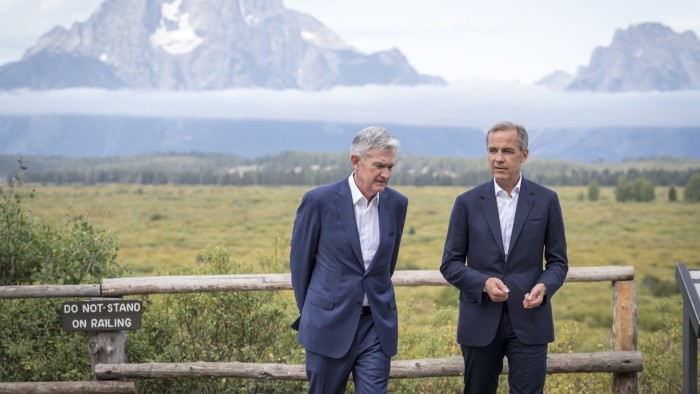Unlock the Editor’s Digest for free
Roula Khalaf, Editor of the FT, selects her favourite stories in this weekly newsletter.
The writer is an FT contributing editor
In August 2019, central bankers and academics gathered at Jackson Hole in Wyoming to talk, among other things, about the dollar. The guest of honour was Mark Carney, then the departing head of the Bank of England. He gave the kind of speech you can only give on your way out, starting a disagreement that doesn’t yet have a clear answer: is the global dollar system inherently problematic, or is it America’s to lose?
Carney warned that the old models of how to be a central banker might not work any more. Everyone in his audience with an economics PhD had learnt that financial co-ordination among countries was inefficient, and that flexible exchange rates and sovereign discretion over their own currencies gave central bankers the tools to fix their own problems. But exchange rates weren’t actually flexible, Carney pointed out, when half of global trade was invoiced in dollars. And when two-thirds of global securities were issued in dollars, tightening at the Fed meant tightening everywhere. It was an illusion that each central bank had sovereign discretion to respond to shocks such as trade wars.
The constraints of a global dollar were already familiar to everyone in the room. But what Carney suggested at Jackson Hole was a radical step. Over the long term, he said, the world couldn’t just stumble from one dominant currency to the next. Perhaps it was possible for central bankers to co-ordinate what he called a “synthetic hegemonic currency” — a basket of central bank digital currencies.
Stanley Fischer, a former vice-chair at the Federal Reserve who had left his job a few months after Donald Trump’s first inauguration, was the first to respond. “The trouble one has is, the problem is not in the IMFS,” he said, referring to the international monetary and financial system. “It’s in the president of the United States.”
The global dollar is an inelegant system. It happened in part because the US was unwilling to co-ordinate with other countries after the second world war when it could just as easily dictate to them. But a decades-long dominant currency regime doesn’t endure through obstinacy alone. The dollar is proof that central bankers already can and do co-ordinate.
In the 1960s, as banks in London built out a massive system of offshore dollar loans and deposits that came to be known as eurodollars, countries found it was useful to have their savings sloshing around in the City, rather than coming home as inflation. Large American companies liked the flexibility to borrow through London, particularly when the Fed was tightening at home.
The political economists Benjamin Braun, Arie Krampf and Steffen Murau argued that you don’t get a system like that unless central bankers want it to be there. Central bank swaps — short-term trades of Fed dollars for sterling from the Bank of England, for example — grew out of regular conversations among central bankers trying to figure out who would be the lender of last resort for a system no one really owned or wanted to admit existed.
When oil producers began to accumulate more profits than they could ever spend on their own populations, the eurodollar system was already in place, rails to move dollars around without ever having to bring them home to wreak havoc. This was the environment that existed when, as the sociologist Greta Krippner has pointed out, the US figured out in the 1980s that it didn’t have to disappoint anyone at home by fixing its current account deficits — it could just sell as many Treasuries as it cared to into an existing offshore dollar system desperate for safe assets.
Then, as banks holding offshore dollars began to teeter in 2008 and again in 2020, the Fed offered dollar swaps to a growing collection of central banks, whose policymakers return to Jackson Hole every year in part to reaffirm the social ties that make the dollar system possible. Until now, the dirty secret of the global dollar system has been that a lot of important people quietly loved it.
Carney is now the prime minister of Canada, responding to threats from the US to his country’s economy and even sovereignty. Any country other than the US precipitously raising and lowering tariffs, gutting its Internal Revenue Service and nonchalantly considering territorial grabs would have seen smoking-hot capital flight months ago.
Only now, though, almost three months into Trump’s second term, are asset managers beginning to reconsider the story of America as an inexhaustible well of safe bets. Only now is the yield on Treasuries climbing, possibly as a sign of risk. The offshore dollar system was already the co-operative, synthetic global currency Carney wanted. The dollar was not imposed by a hegemon. It is instead, as Fischer predicted, being torn apart by a madman.
Read the full article here




